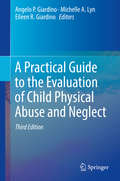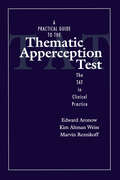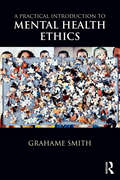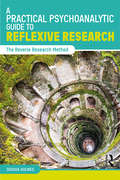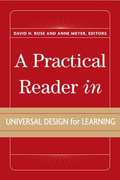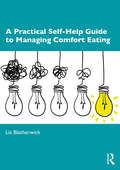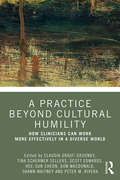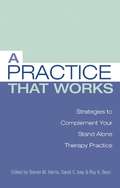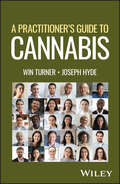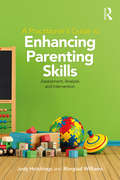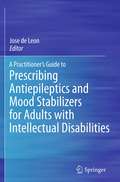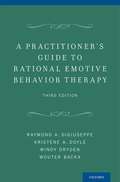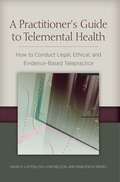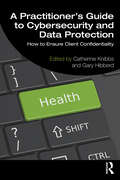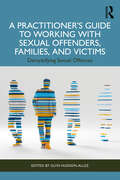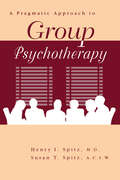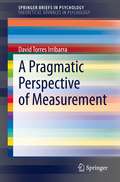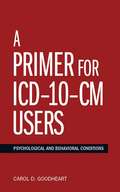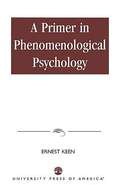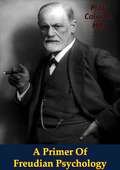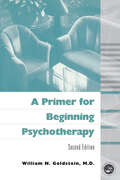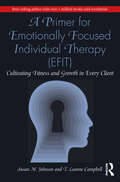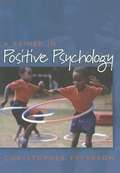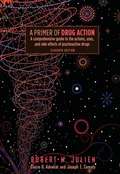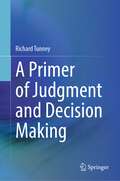- Table View
- List View
A Practical Guide to the Evaluation of Child Physical Abuse and Neglect
by Angelo P. Giardino Eileen R. Giardino Michelle A. LynThe impact of child maltreatment on victims, families, and society—from immediate medical care and legal services to long-term mental health care and law enforcement—cannot be understated. And it remains a severe problem in spite of increasing public awareness and stricter laws. To keep up with growing body of professionals staying informed on this subject, the third edition of A Practical Guide to the Evaluation of Child Physical Abuse and Neglect assists the reader in recognizing abuse/neglect (exclusive of sexual abuse) in children and youth, and determining its extent. Illustrated with clinical photographs, the Guide details systematic evaluation procedures, explains the tasks of an evaluation team, and expands and updates the knowledge base in these and other major areas:Specific injuries, including burns, bruises, fractures, and head and abdominal injuriesMalnourishment and other forms of neglectMedical child abuse (previously known as Munchausen Syndrome by Proxy)Maltreatment of children with special health care needsDomestic partner violencePrevention strategies, psychosocial assessment, collaborations with law enforcement and the courts, and moreThe new edition of A Practical Guide to the Evaluation of Child Physical Abuse and Neglect offers expert information useful to practitioners across professional domains: public health professionals in maternal and child health and school settings; physicians and nurses; clinical social workers, child psychologists, and school psychologists; and attorneys and law enforcement personnel.
A Practical Guide to the Thematic Apperception Test: The TAT in Clinical Practice
by Edward Aronow Kim Altman Weiss Marvin ReznikoffThis valuable book provides the student with a short, manageable, comprehensive guide to the Thematic Apperception Test (TAT), a major psychological measuring instrument. The TAT is effective in telling the clinician how the subject views the self and the world in his or her unique way. This sweeping introduction to this test as well as other lesser-known apperceptive techniques considers children, adolescents, and adults. and gives special attention to cross-cultural issues and the application of apperception techniques to minority populations. Additionally, the interesting history of apperception techniques, sample protocols, and the administration and interpretation of the tests are included.
A Practical Introduction to Mental Health Ethics
by Grahame SmithAs a mental health nurse, possessing an ethical sensibility and developing ethical reasoning is vital. This book is a practical introduction to the skills and knowledge the mental health nurse is professionally required to develop in their journey towards effectively managing complex ethical decisions. Written with the training mental health nurse in mind, this book is a clear and concise guide on how to approach common, ethically-complex situations mental health nurses will eventually find themselves faced with. It includes textboxes which take the reader into a ‘real world’ scenario to help them explore the moral and ethical issues discussed throughout the chapter. To ensure professional currency, the content of this book is mapped to the Nursing and Midwifery Council’s pre-registration education standards of 2010, and uses a scenario-based approach in order to provide a pragmatic and robust resource. A Practical Introduction to Mental Health Ethics is essential reading for pre-registration mental health nursing students, while also being of value to registered mental health nurses working in ethically challenged areas such as dementia care, psychiatric intensive care units.
A Practical Psychoanalytic Guide to Reflexive Research: The Reverie Research Method
by Joshua HolmesA Practical Psychoanalytic Guide to Reflexive Research offers an accessible guide to enriched qualitative research. In this novel approach, the researcher’s feelings and empathy in relation to participants take centre stage, leading to fresh, exciting and usable research findings. The psychoanalytic concept of reverie refers to those startling and unexpected images, feelings and daydreams which can come to mind as we interact with other people in the world. Qualitative research involves interacting with human subjects, and the book shows how uncanny or troubling reverie experiences can be turned to good use by being linked back to deeper research questions and hypotheses.Joshua Holmes critically explores the role of self-reflection (reflexivity) in psychoanalysis and qualitative research. Practical guidance is offered while planning research; conducting research interviews; analysing interview data; teaching methods which foster the capacity for reverie; and in relation to research groups. Examples are given throughout, including the author’s own missteps along the way, in which he shares the importance of learning from experience. The book breathes life into research processes offering much-needed clinical relevance. The method moves away from one-size-fits all, formulaic research procedures and brings tenor, colour and texture into the research process, to create vivid, real-life meaningful findings.A Practical Psychoanalytic Guide to Reflexive Research will be essential reading for undergraduate and postgraduate qualitative researchers wishing to enhance their reflexive practice, while psychotherapists and psychoanalysts will find a genuinely psychoanalytic research method, where their clinical skills become vital capacities rather than an awkward hindrance.
A Practical Reader in Universal Design for Learning
by Anne Meyer David H. RoseUniversal Design for Learning (UDL) stands at the forefront of contemporary efforts to create universal access to educational curricula for all students, including those with disabilities. The universal in UDL does not mean there is a single optimal solution for everyone.
A Practical Self-Help Guide to Managing Comfort Eating
by Liz BlatherwickA Practical Self-Help Guide to Comfort Eating is a workbook that helps build understanding and make sense of emotional or comfort eating and offers new ways to think about and manage relationships with food and weight. Based on a tried and tested 10-week course, the book uses an integrative therapeutic approach, underpinned by a Transactional Analysis Ego State model. It is intended to help readers work out what they might really be hungry for when they eat emotionally and help them better understand the underlying issues that contribute to their emotional eating. This workbook offers a range of skills and exercises that can help manage uncomfortable feelings without using food, and the reader is encouraged to try as much as they can and then begin to work out what works for them. With a wealth of case studies and exercises, this highly practical book will be helpful to anyone struggling between their emotional eating habits and their body weight.
A Practice Beyond Cultural Humility: How Clinicians Can Work More Effectively in a Diverse World
by Claudia Grauf-Grounds Tina Schermer Sellers Hee-Sun Cheon Shawn Whitney Peter M. Rivera Scott Edwards Don MacDonaldA Practice Beyond Cultural Humility offers specific guidance to support students and practitioners in providing on-going, culturally-attuned professional care. The book introduces a multicultural diversity-training model named the ORCA-Stance, an intentional practice which brings together four core components: Openness, Respect, Curiosity, and Accountability. Drawing from an array of influences, it showcases work with common clinical populations in a variety of contexts, from private practice to international organizations. Each clinical chapter offers a brief review of information relevant to the population discussed, followed by a case study using the ORCA-Stance, and a summary of recommended best practices. In each case, the practice of the ORCA-Stance is shown to allow relationships to become more culturally sensitive and, therefore, more effective. A Practice Beyond Cultural Humility provides practical examples, research, and wisdom that can be applied in day-to-day clinical work and will be valuable reading for a wide-range of mental health students and clinicians who seek to continue their professional development.
A Practice that Works: Strategies to Complement Your Stand Alone Therapy Practice
by Roy A. Bean Steven M. Harris David C. IveyIn the advent of managed care and the continuing decline in reimbursement felt across the various disciplines of mental health have had profound impacts upon the quality and quantity of care in the field. As it has become increasingly difficult for a practitioner in private practice to provide a satisfactory level of care while earning a living in the process, many clinicians have become more innovative in the services they offer their clients. This book pulls together a group of mental health professionals who have branched out into new markets and services. A Practice that Works represents an anthology of new knowledge in the field, as chapter contributors describe in revealing detail their own innovative techniques. After first describing the idea behind a strategy such as Wilderness Therapy Programs, the editors discuss the logistics of billing issues pertinent to the strategy and provide practical steps to its implementation, follow-through and development. Finally each chapter includes a 'testimonial' from the editors before considering issues such as any other implications of the strategy, how the strategy can fit into one's larger therapeutic model, and how this new way of thinking has impacted the author's life and practice. This timely book should appeal to professionals in all areas of the mental health fields, and is written in a general style that will not turn any of them away from the innovative lessons to be gleaned from such a unique compilation.
A Practitioner's Guide to Cannabis
by Win Turner Joseph HydeInform and improve your practice with this comprehensive resource on cannabis use and abuse A Practitioner's Guide to Cannabis expertly cuts through the political and cultural noise surrounding cannabis use and provides a relevant, timely, and agnostic analysis of cannabis use and abuse. Incisive and insightful, this book assists behavioral health practitioners to increase their skills in screening, assessment, and intervention while helping them to adopt evidence-based practices. Health care providers will come to rely on this comprehensive resource to understand the risks of cannabis use and to provide a set of intervention strategies effective in a variety of settings. The book covers topics crucial for understanding the work of behavioral health and health practitioners dealing with cannabis issues, including: the complexities of cannabis science our cultural interpretations of the use of cannabis the risks involved with cannabis use effective interventions patients' expressions of their own "biopsychosocial" experience The book is perfect for social workers, psychologists, professional counselors, alcohol/drug counselors, and providers of health care, including physicians, nurses, and physician's assistants.
A Practitioner's Guide to Enhancing Parenting Skills: Assessment, Analysis and Intervention
by Judy Hutchings Margiad WilliamsA Practitioner’s Guide to Enhancing Parenting Skills: Assessment, Analysis and Intervention offers a detailed and stepwise approach to problem behaviour analysis and management, based on the successful and evidence-based Enhancing Parenting Skills Programme (EPaS). This unique programme, based on 40 years of Professor Hutchings’ clinical work, draws on social learning theory (SLT) principles designed to support families of young children with behavioural challenges. In this book, Hutchings and Williams combine clear practical guidance with case examples and useful checklists to deliver SLT-based interventions tailored to the unique needs of individual families. The case analysis identifies the assets and skills in the home situation and the functions of problem behaviours before creating a set of achievable goals. The latter part of the manual includes examples of intervention strategies to address several common problems, including toileting, eating and night-time problems. This book is an invaluable tool for all practitioners working in Early Years including CAMHS primary care staff, social workers, clinical psychologists, health visitors and school nurses.
A Practitioner's Guide to Prescribing Antiepileptics and Mood Stabilizers for Adults with Intellectual Disabilities
by Jose De LeonEmotional, behavioral, and neuropsychiatric conditions are common in individuals with intellectual disabilities (IDs), most notably epilepsy, aggression, self-injurious behaviors, and bipolar and other mood disorders. Despite the prevalence of such problems, there is a scarcity in the literature of reliable information on medical treatments for those with IDs. A Practitioner's Guide to Prescribing Antiepileptics and Mood Stabilizers for Adults with Intellectual Disabilities provides a detailed framework for prescribing for this challenging population. Featuring the most up-to-date information on factors that inform prescribing, the Guide addresses basic issues and controversies (e.g., the rift between evidence-based and personalized medicine) in treating adults with cognitive deficits. Clients' specific needs are emphasized in developing appropriate and effective pharmacological intervention for improved outcomes and quality of life. Drugs discussed in the Guide include carbamazepine, clonazepam, diazepam, ethosuximide, felbamate, gabapentin, lacosamide, lamotrigine, levetiracetam, lithium, lorazepam, oxcarbazepine, phenobarbital, phenytoin, pregabalin, primidone, rufinamide, tiagabine, topiramate, valproate, and zonisamide. For each of these compounds, the guidelines cover: Indications for use; relative and absolute contraindications.Assessment during treatment; therapeutic drug monitoring; warning signs and symptoms for caretakers.Dosage: administration; initial and maximum recommended dosage; modifications associated with drug-drug interactions, personal characteristics, and (where appropriate) genetic variations.Adverse drug reactions: common, relatively uncommon, and potentially lethal, plus risk of metabolic syndrome.Guidelines for discontinuation.References, tables, and drug utilization reviews.A Practitioner's Guide to Prescribing Antiepileptics and Mood Stabilizers for Adults with Intellectual Disabilities is an indispensable decision-making reference for psychiatrists, neuropsychologists, psychopharmacologists, neurologists, internists, and clinical psychologists.
A Practitioner's Guide to Rational Emotive Behavior Therapy
by Windy Dryden Raymond A. Digiuseppe Kristene A. Doyle Wouter BackxA Practitioner's Guide to Rational-Emotive Behavior Therapy reviews the philosophy, theory, and clinical practice of Rational Emotive Behavior Therapy (REBT). This model is based on the work of Albert Ellis, who had an enormous influence on the field of psychotherapy over his 50 years of practice and scholarly writing. Designed for both therapists-in-training and seasoned professionals, this practical treatment manual and guide introduces the basic principles of rational-emotive behavior therapy, explains general therapeutic strategies, and offers many illustrative dialogues between therapist and patient. The volume breaks down each stage of therapy to present the exact procedures and skills therapists need, and numerous case studies illustrate how to use these skills. The authors describe both technical and specific strategic interventions, and they stress taking an integrative approach. The importance of building a therapeutic alliance and the use of cognitive, emotive, evocative, imaginal, and behavioral interventions serves as the unifying theme of the approach. Intervention models are presented for the treatment of anxiety, depression, trauma, anger, personality disorders, and addictions. Psychologists, clinical social workers, mental health counselors, psychotherapists, and students and trainees in these areas will find this book useful in learning to apply rational-emotive behavior therapy in practice.
A Practitioner's Guide to Telemental Health: How to Conduct Legal, Ethical, and Evidence-Based Telepractice
by Marlene M. Maheu; Eve-Lynn Nelson; David D. LuxtonMany of the skills needed for competent telepractice are the same as in conventional in-office care. <P><P>However, physical distance as well as technology itself can create challenges to safe and ethical practice. <P><P>For instance, when conducting suicide assessment and intervention via videoconferencing, the clinician must be prepared to involve emergency or support services at the patient's location, while providing all the usual treatment documentation and follow-up.
A Practitioner’s Guide to Cybersecurity and Data Protection: How to Ensure Client Confidentiality
by Catherine Knibbs Gary HibberdA Practitioner’s Guide to Cybersecurity and Data Protection offers an accessible introduction and practical guidance on the crucial topic of cybersecurity for all those working with clients in the fields of psychology, neuropsychology, psychotherapy, and counselling. With expert insights, it provides essential information in an easy-to-understand way to help professionals ensure they are protecting their clients’ data and confidentiality, and protecting themselves and their patients from cyberattacks and information breaches, along with guidance on ethics, data protection, cybersecurity practice, privacy laws, child protection, and the rights and freedoms of the people the practitioners work with. Explaining online law, privacy, and information governance and data protection that goes beyond the GPDR, it covers key topics including: contracts and consent; setting up and managing safe spaces; children's data rights and freedoms; email and web security; and considerations for working with other organisations. Illustrated with examples from peer-reviewed research and practice, and with practical ‘top tips’ to help you implement the advice, this practical guide is a must-read for all working-from-home practitioners in clinical psychology, developmental psychology, neuropsychology, counselling, and hypnotherapy.
A Practitioner’s Guide to Working with Sexual Offenders, Families, and Victims: Demystifying Sexual Offences
by Glyn Hudson-AllezThis unique text aims to cover the many variations of presentations that a mental health professional needs to address in order to conduct effective work with sex offenders and alleged offenders, their victims, as well as their families and children.The book is divided into three sections. It commences with an overview of the criminal justice process and its ramifications, not just for the alleged offender, but also for the wider family and friends who may feel totally out of control over what is happening in their lives, as well as for the victim. It also covers the secondary victimisation of the children of alleged offenders. The next section is designed to take some of the fear out of working with these clients, looking at unexpected specific issues that may be presented with these clients, how to address the client’s trauma history, and how to support them on their journey through the criminal justice system. Chapters include working with non-offending partners, within minority groups like those within the neurodivergent or LGBTQIA+ communities, with women who commit offences, as well as with children and adolescents. Section three covers some of the therapeutic ethical dilemmas within this work, including supervision, confidentiality, safeguarding, and disclosure. Each chapter in the book is written by an experienced, hands-on therapist, giving voice and humanity to their clients.This book is designed for all the mental health workers who find the ubiquitous issue of sexual abuse, in all its forms, coming through their office door.
A Pragamatic Approach To Group Psychotherapy
by Henry Spitz Susan SpitzPublished in 1998, A Pragamatic Approach To Group Psychotherapy is a valuable contribution to the field of Psychotherapy.
A Pragmatic Perspective of Measurement (SpringerBriefs in Psychology)
by David Torres IrribarraThis book aims to address the challenges of defining measurement in social sciences, presenting a conceptualization of the practice of measurement from the perspective of the pragmatic tradition in philosophy. The book reviews key questions regarding the scope and limits of measurement, emphasizing that if the trust that the public places on measures in the social sciences relies on their connection to the notion of measurement in the physical sciences, then the clarification of the similarities and differences between measurement in the physical and the social realms is of central importance to adequately contextualize their relative advantages and limitations. It goes on to present some of the most influential theories of measurement such as the “classical view” of measurement, operationalism, and the representational theory of measurement, as well as more methodological perspectives arising from the practice of researchers in the social sciences, such as the latent variable perspective, and from the physical sciences and engineering, represented by metrology. This overview illustrates that the concept of measurement, and that of quantitative methods, is currently being used across the board in ways that do not necessarily conform to traditional, classical definitions of measurement, pushing the boundaries of what constitutes our technical understanding of it. Moreover, what constitutes a technical understanding of measurement, and the theoretical commitments that it entails, must vary in different areas. In this context, disagreement on what is constitutive of measurement is bound to appear. Pragmatism is presented as a theoretical perspective that offers the advantage of being flexible and fallibilist, encouraging us to abandon the pursuit of a timeless and perfect definition that attempts to establish decontextualized/definitive demarcation criteria for what is truly measurement. This book will be of particular interest for psychologists and other human and social scientists, and more concretely for scholars interested in measurement and assessment in psychological and social measurement. The pragmatic perspective of measurement presents a conceptual framework for researchers to ground their assessment practices acknowledging and dealing with the challenges of social measurement.
A Primer For ICD-10-CM Users: Psychological and Behavioral Conditions
by Carol D. GoodheartThis primer aims to give psychologists and other mental health professionals the information necessary to use the World Health Organization's 10th edition of the International Classification of Diseases and paves way for successful adoption of ICD-11.
A Primer In Phenomenological Psychology
by Ernest KeenOriginally published in 1975 by Holt, Rinehart and Winston, this volume introduces phenomenological psychology and is intended for the beginning student as well as for professionals in the field. It includes the historical status of the major concepts mentioned, a brief summary of the major philosophical contributions of phenomenology, and numerous references for further investigation.
A Primer Of Freudian Psychology
by Prof. Calvin S. HallBASICS OF HUMAN BEHAVIORAbsorbing, easy to read and understand, here is a fascinating presentation of Freud's principal theories on psychology. Culled from forty years of writing by the founder of psychoanalysis, this is the first book which gives, in a comprehensive and systematic form, Freud's thinking on the organization, dynamics and development of the normal human personality.Calvin S. Hall outlines Freud's penetrating diagnosis of the balances existing between the mind and emotions, and points out his important discoveries about the parts played by instincts, the conscious and unconscious, and anxiety in the functioning of the human psyche. In discussing the elements that form personality, the author explains the ideas of the pioneer thinker in psychology on defense mechanisms, the channeling of instinctual drives, and the role of sex in the boy and girl maturing into man and woman.Lucid, illuminating and instructive, this is an important book for everyone who wants to understand human behavior--in himself and in others."A Primer of Freudian Psychology is compact, readable, accurate."--Gordon W. Allport, Professor of Psychology, Harvard University
A Primer for Beginning Psychotherapy
by William N. GoldsteinDesigned especially for students and mental health professionals in the early stages of their careers, this primer is a practical guide to psychotherapy --
A Primer for Emotionally Focused Individual Therapy (EFIT): Cultivating Fitness and Growth in Every Client
by Susan M. Johnson T. Leanne CampbellFrom best-selling author, Susan M. Johnson, with over 1 million books sold worldwide! This essential text from the leading authority on Emotionally Focused Therapy, Susan M. Johnson, and colleague, T. Leanne Campbell, apply the key interventions of EFT to work with individuals, providing an overview and clinical guide to treating clients with depression, anxiety, and traumatic stress. Designed for therapists at all levels of expertise, Johnson and Campbell focus on introducing clinicians to EFIT interventions, techniques, and change processes in a highly accessible and practical format. The book begins by summarizing attachment theory and science – the theoretical basis of this model – together with the experiential approach to change in psychotherapy. Chapters describe the three stages of EFIT, macro-interventions, such as the EFIT Tango, and various micro-interventions through clinical exercises, case studies, and transcripts to demonstrate this model in practice with individuals, highlighting the unique benefits of EFT as a cross-modality approach for treating emotional disorders. With exercises interwoven throughout the text, this book is built to accompany in-person and online training, helping the practicing clinician offer targeted and empirically tested interventions that not only alleviate symptoms of distress but expand the client’s emotional balance, agency, and sense of self. As the next major extension of the EFT approach, this book will appeal to therapists already working with couples and families as well as those just beginning their professional journey. Psychotherapists, psychologists, counselors, social workers, and mental health workers will also find this book invaluable.
A Primer in Positive Psychology
by Christopher PetersonPositive psychology is a new approach that is based upon the scientific study of what goes right in life. Suitable for a one-semester college course, this introductory text covers all of the main topics of concern to the field. These include (for example) happiness, character strengths, values, wellness, and positive interpersonal relationships. Peterson teaches psychology at the U. of Michigan. Annotation ©2006 Book News, Inc., Portland, OR (booknews.com)
A Primer of Drug Action: A Comprehensive Guide to the Actions, Uses, and Side Effects of Psychoactive Drugs (11th edition)
by Robert M. JulienA definitive guide to the pharmacology of drugs that affect the mind and behavior with over 40% new research citations. A clearer and current presentation on the mechanisms of drug action, etiologies of major psychological disorders, rationales for drug treatment, and the uses of psychopharmacology in patient care.
A Primer of Judgment and Decision Making
by Richard TunneyThe book is intended as a primer and discusses the main areas within judgment and decision making. However, these topics are not siloed. Instead, a narrative arc throughout the book has a higher level of critical appraisal of the key concepts and how they relate to some of the big questions about the nature of human rationality. The book begins by introducing two perspectives on rationality. The first describes how we decide on the goodness of a decision. This is a surprisingly recent concept called Rational Choice Theory, which was formed from a collection of books written around the time of the Second World War, that deal with how we think about risk as a probability and goodness as utility. In short, Rational Choice Theory argues that to be rational, people should always make the decision that maximizes subjective expected utility. The book goes on to describe the consensus view that emerged in the late 1960s and came to dominate our thinking about decision making, namely that people rarely make rational decisions. In fact, many Nobel prizes have been handed out for work showing that humans are not rational creatures (e.g. Daniel Kahneman, Richard Thaler, Robert Shiller). The book concludes with recent theoretical developments in our understanding of how people make decisions that reconcile Rational Choice Theory with human irrationality. Although aimed primarily at second year undergraduates studying judgement and decision making as a core component of cognitive psychology, the book will also be relevant to third year electives in and MSc programmes. The book will also interest undergraduates studying economics, and undergraduates studying more general degrees in liberal arts or natural science. As an introductory text the book assumes no prior knowledge of judgement and decision making, cognitive psychology or economics. However, the level of the book assumes that the reader is familiar with academic texts and has experience of critical thinking. A key requirement of the reader is a willingness to relate academic concepts to the real world, and to try and understand the bigger picture about human psychology and its place in society.
